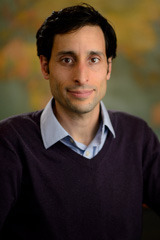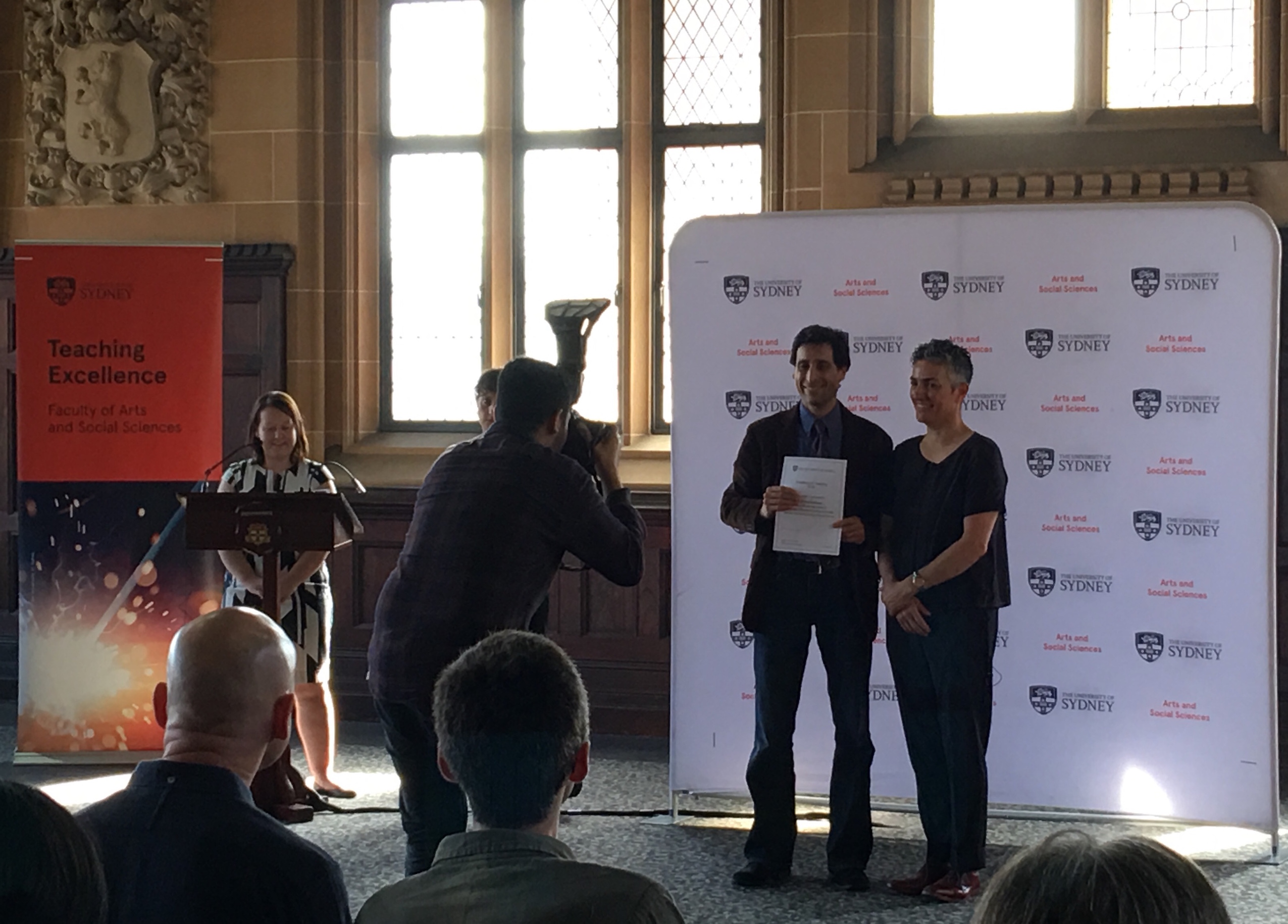
Many congratulations to our most recent recipient of a Faculty Teaching Excellence Awards – Andres Rodriguez. The award was presented by the Dean Annemarie Jagose at a ceremony on October 31, 2018 at MacLaurin Hall at the University of Sydney, along with other recipients from across the Faculty.
Dr. Rodriguez received a Teaching Excellence Award primarily for his outstanding work in developing a suite of new Chinese History units, and also his sensitive and thoughtful approach to teaching the modern history of China.
The Faculty of Arts and Social Sciences Teaching Excellence Awards program is designed to recognize and reward the teaching excellence of staff at all career levels, to encourage teachers to engage in reflective teaching practices, and to promote and support the development of high quality and innovative teaching.
Recipients have demonstrated an evidence informed approach to critical reflection on teaching and learning, evaluation of their teaching practice, engagement with higher educational research, and a focus on improving student learning.
One of Dr. Rodriguez’s nominees wrote: “I am delighted to have the opportunity to write this statement in support of Andres Rodriguez’s nomination for a FASS teaching award. Andres’ reputation as a teacher of extraordinary talent, energy and generosity has been firmly established during the years he has been employed at this university….Andres has remarkably high student satisfaction ratings in his units on Chinese history – a success that has contributed significantly to improved enrolments and retention of students in this field….many colleagues have noted just how generous, helpful, supportive and creative Andres proved to be as a colleague and co-teacher. He is always happy to talk about teaching, and more than generous in sharing insights and resources with both junior and more senior colleagues. Thoughtful, diligent, inventive, caring, lively, and manifestly dedicated to the interests of his students, he is a teacher to celebrate and reward.”
Dr. Rodriguez was also asked to make a short speech about his teaching to the gathering:
“I am a specialist in modern China who has had the privilege of leading hundreds of students on their journey to make sense of a very complicated history of China in the twentieth century.
At Sydney Uni I have students from all sorts of backgrounds, many of them eager to break out of their Eurocentric shell and ready to understand the world from a very different perspective.
I should also note that many of my students are Chinese, who openly tell me that they are curious to see how Western societies see China and how their history is taught in a place like Australia.
This rich diverse student body makes each semester a unique learning experience for all of us in the classroom.
Chinese students with personal ties to the region might share unique memories of family histories that are aligned with the broader themes we discuss in class. Students from other disciplines such as archaeology or classics also bring their own particular understandings of what comprises ‘evidence’ to classroom discussions.
How does one go about in bringing these experiences into the classroom? And how can we create the space for those who are not inclined to speak in class or perhaps lack the confidence as non-native speakers of English? After all, there is no effective student learning if we cannot hear the voice of the student.
I took it upon myself to find a way that would allow students to express what was going on in their minds as they began to prepare for our weekly tutorial. As I am sure many of you here will agree with, sometimes we can obtain results with simple yet meaningful changes in our teaching. This meant reconceptualizing the tutorial as a meeting that begins when students sit down to read and prepare for each weekly session rather than when the clock in the classroom says so. Together with Bec Plumbe we designed a simple platform allowing students to submit any meaningful thoughts, reflections, or comments on what they had encountered in their readings.
The response was overwhelming – intellectual curiosity had been unleashed as students sent me new sources they had found after a particular theme caught their attention
Chinese students ventured into their own wartime family histories or drew upon their own cultural backgrounds which I would then address in class and ask if they were willing to elaborate on for their classmates.
I too would highlight comments in class that I found particularly meaningful, each of these were helpful in drawing out what we would discuss as a class each week.
Creating a space for students that allows them to listen to their voice, and to each other’s voices is a meaningful way to help them understand how they relate to the world, and to learn about who they are. You will no doubt recognise in these words the trappings of cultural competence, a key skill that helps students to acknowledge and respect the rich diversity of our world.
In these days of anger that shake the world at so many levels, I hope my contribution to the learning experience of my students will help dispel the clouds of hatred and racism that are now gathering over our horizons.
Dr Andres Rodriguez
Lecturer in Modern Chinese History
School of Philosophical and Historical Inquiry
The University of Sydney
China Book Review Editor for Asian Studies Review

